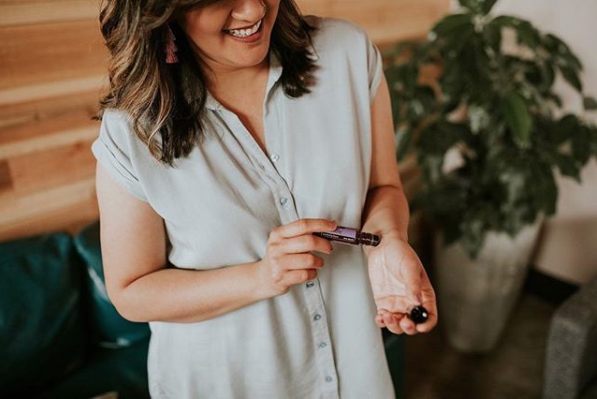Q: What type of therapy work do you do?
A: I am a licensed professional counselor and provide therapy specifically for young ladies 16 and up and adult women who have experienced trauma in childhood due to abuse and/or neglect. I also focus on helping survivors of sexual abuse, loss through miscarriage and unplanned pregnancies. I do this by taking a holistic and person-centered approach to therapy, trusting that my clients know their stories better than I do while providing support, encouragement and guidance in their healing and self-discovery process.
Q: How do you incorporate holistic healing into your work?
I incorporate holistic healing by treating the person as a whole — mind, body and heart. We touch on what the person needs in each aspect of their life. I do this by helping the client maintain awareness of their body by incorporating holistic support such as aromatherapy, mindful movement and mindful meditation.
Q: Why take a holistic approach to counseling people? What makes your work different from other therapists?
A: As a therapist who works with individuals who have had traumatic experiences, I begin therapy with the understanding that trauma is stored in the body, creating not only mental distress but also physical symptoms that can negatively impact a person’s life. The same goes for stress, anxiety and depressive symptoms.
What sets my work apart from others’ is the deep passion I have to hold space for anyone who has experienced trauma. I have been a witness to what unhealed trauma due to child abuse, physical and mental partner abuse, betrayal from an intimate partner and neglect from parental figures can do to a person.
I, myself, have dealt with the trauma of an unplanned pregnancy and the trauma of infertility and miscarriages. I chose this path largely due to the long history of pain and traumatic experiences found in my own family tree.
There are people I loved who lived wounded and with no support to help heal their brokenness. I wanted to make sure I did what I could to be a person who honored the broken paths of others, while also providing encouragement and hope in the process of trauma recovery.
I am a firm believer that our past experiences do not define our future. What may have happened to us is not our fault, but how we choose to heal from those experiences is certainly our responsibility. Overcoming the emotional and physical pain that trauma can cause is possible and is for everyone who chooses it.
Q: In your social media, you stress the importance of self-care. Why do you feel this is an important part of your practice?
A: Self-care is the basis of beginning any kind of healing journey. The consistent practice of caring for your most basic needs can positively impact your long-term wellness. Starting out small like paying your bills on time or drinking just a little bit more water can have a ripple effect into implementing more mindful types of self-care practices like setting healthy boundaries for yourself and others or practicing self-compassion.
Q: How can people recognize they need self-care?
A: Self-care practices are for everyone. It is not limited to a certain type of person or particular activity such as spa days, movie nights or bubble baths (which I call fake self-care if it’s being used to escape reality). Self-care at its very core is taking care of the self — mind, body and heart.
A good way to recognize that you need to up your self-care game is to ask yourself if you have been feeling more overwhelmed, stressed, anxious or depressed than normal, or if you have been indulging in unhealthy habits to escape reality. These are good indicators that you should practice more self-compassion, seek out mental health therapy and incorporate at least one thing in your day that will move you towards real self-love.
Q: How can people begin to practice self-care?
A: First, get honest with yourself. If you feel as though your life is out of balance, chances are you need to take some time to self reflect and make some healthy changes. Second, beginning a self-care practice can be as simple as setting an intention for your day to do one thing for your mind, one thing for your body and one thing for your heart. Make sure that what you choose to do is positive, affirming and not destructive to your self-esteem or overall wellness.
Q: Would you say self-care plays a huge role in taking care of one’s mental health?
A: Absolutely! Implementing self-care plays a major part in our mental wellness. However, practicing self-care can be difficult for those who may have had difficult upbringings or negative views of themselves. If a person does not believe they are worth caring for, worth love, self-respect, time or attention, then asking them to practice self-care will be challenging. If you find yourself in this position, it is important to work through those negative beliefs about yourself with a therapist. Once the destructive self-talk is silenced, it will become easier to implement positive and healthy self-care rituals for yourself.
Q: What professional advice can you give to people who are interested in holistic healing for mental health?
A: Interview multiple therapists before making your first appointment. Know your options, be informed and ask questions.
When you are interviewing therapists, ask them what their self-care practice looks like. If they are unable to share their practice with you, find another therapist. I wholeheartedly believe that if a therapist cannot hold space and honor their own self-care and mental wellness, they cannot hold space and honor your journey to healing.
Check out their credentials. There are plenty of people who say they are holistic, mindful, creative, but don’t actually practice these things the way the client would expect. Ask what you should expect from a typical session with them and how they incorporate these types of holistic therapies into their counseling sessions. Ask about the training and classes they have taken that support what they advertise as holistic mental health providers.
Q: What is holistic healing?
A: Holistic healing recognizes the treatment of the whole person, seeing each part as intimately interconnected and not separate entities within the individual. Each aspect of the self impacts all other parts.
It also means that, although these modalities are used to support the client mentally and emotionally, it is not the only way to find peace and empowerment. Healing is not a destination that you arrive at. It is a beautiful but sometimes painful process of becoming the whole person you were created to be.













